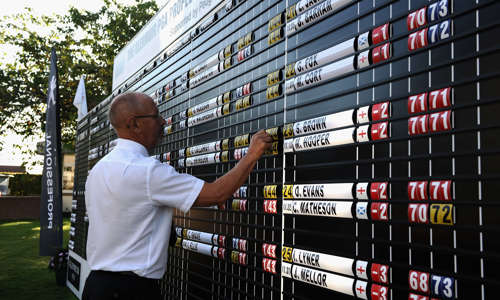Financial support scenarios (Republic of Ireland)
The PGA has created various scenarios to provide guidance on updated government support for Members in the Republic of Ireland.
These scenarios are relevant as of November 2020.
Scenario 1
David is a Tournament Player, earning most of his income from playing at regional and national level. In the last couple of years he has developed a solid reputation as a Golf Coach and 100% of his income is generated through his sole trader business as a PGA Professional.
At the start of the pandemic, with the tournaments originally included on the PGA in Ireland’s schedule being cancelled, David’s primary source of income completely dried up. Similarly, his coaching diary, normally full to capacity such as his playing commitments allow, was devoid of bookings.
As a self-employed person, he was able to secure Government support through the by applying for the COVID-19 Pandemic Unemployment Payment because he had to stop working in the middle of March due to COVID-19, and met the age and residency criteria.
Since David’s business is very much dependent on his own success as a player with regular prize fund winnings and his personal reputation as a coach, he had limited commitments during the initial lockdown period and was able to get his business active again as soon as lockdown was lifted.
He was able to play in the majority of the PGA in Ireland’s tournaments after they restarted in July, with some success on the golf course allowing him to finish in the top 10 of the 2020 Order of Merit. However, of necessity, the schedule was limited in relation to other years, so the value of his tournament winnings was lower than he would normally have expected.
David had started coaching again when the original lockdown restrictions were lifted, with a healthy number of forward booking throughout October and November. However, these arrangements had to be put on hold when Ireland was placed back in lockdown from midnight on 21 October.
At this time of year, David generally makes a number of trips to Europe and the Middle East to play in Overseas pro-ams, but with the travel restrictions currently in place, and the risk of new restrictions being implemented at short notice, he and his teams have not made any such plans for this winter.
So, with the competitive golf season having ended, coaching being put on hold, and no overseas pro-ams in the offing, all of David’s income streams have dried up as a result of the pandemic.
As in the springtime, he again had to consider what Government support might be available to him.
Because of his self-employed status, he is ineligible for the Employment Wage Subsidy Scheme (“EWSS”) but believes, as before, he should be in a position to claim the COVID-19 Pandemic Unemployment Payment (“PUP”) since he has effectively had to stop working altogether during the 6 week lockdown.
David normally draws an average of €500 per week from his business, and his application for the COVID-19 PUP which he made on-line through www.mywelfare.ie was based on this figure.
He meets all the eligibility criteria in relation to age, residency and his insurable self-employed status, and at least for the duration of this lockdown, he will, like many others, be actively seeking work. In fact, if he is unable to refill his coaching diary for December, he may consider seeking work throughout the Christmas and New Year period.
In the meantime, he will be in receipt of a weekly COVID-19 PUP of €350, a personal rate which is linked to his previous earnings, after his application was accepted. Had his income been lower, the level of support would also have been lower, depending on which band of average weekly earnings was applicable. This PUP is available at the current level until 31 January 2021, after which it will be reduced before the scheme officially ends on 1 April 2021, although it closes to new applicants at the end of 2020.
David is grateful for the Government support available to him under the COVID-19 Pandemic Unemployment Payment scheme since he has had to stop working as a result of the current COVID-19 lockdown restrictions in the Republic of Ireland. He intends to make use of some of the time available to him between now and 3 December to undertake some CPD to equip him for further developing his business in the future.
Scenario 2
Jonathan is a Club Professional who has been running a successful business as a sole trader for a number of years. He continued trading until such times as the golf courses throughout the island of Ireland had to close in March 2020 because of the COVID pandemic.
Jonathan was able to take advantage of the Republic of Ireland government’s COVID-19 Wage Subsidy Scheme as a method of keeping his Assistant registered as an employee and the COVID-19 Pandemic Unemployment Payment for himself, given that he had to stop working.
Golf reopened in Ireland, on a limited basis, in the middle of May, and Jonathan started back at that time and stopped claiming the Pandemic Unemployment Payment for himself. He brought his Assistant back when activity began to increase on the easing of travel restrictions in June, at which time he stopped claiming support under the Wage Subsidy Scheme.
During July, August and September, golf proved popular as one of the first participation sports to be allowed, and although this kept Jonathan busy, general trading continued to be adversely affected as a result of COVID. Distancing and other safeguarding measures impacted on footfall in his shop, golf club hospitality restrictions meant fewer members and visitors on site and people generally concentrated their spending on essential shopping.
Despite that, Jonathan continued to trade at what he considered to be a reasonable level, working long hours and welcoming members and visitors to the facility. It therefore came as a shock when Ireland was placed back in lockdown from midnight on 21 October, with just two days’ notice.
Consequently, golf has again ceased, hospitality has been mothballed and non-essential retail has had to stop.
Jonathan realised he would again need to seek government support, but he understood that the type and level of support had changed since the original days of the pandemic.
He quickly confirmed that the main support now available to him would be the Employment Wage Subsidy Scheme (“EWSS”) which runs from 1 September 2020 to 31 March 2021 and replaces the earlier COVID-19 Wage Subsidy Scheme, and the COVID-19 Pandemic Unemployment Payment, the terms of which have also changed from earlier in the year.
Jonathan entered into discussions with his Assistant, whose average weekly earnings in 2019 and 2020 were €250 per week, on the best way to manage through the situation, and they have concluded that there are two options to be considered.
Firstly, if Jonathan lays the Assistant off as a result of the lockdown, the Assistant would be in a position, as an individual, to claim the COVID-19 Pandemic Unemployment Payment. At his level of average earnings, he would be entitled, under the current rates, to a weekly payment of €250. From 1 February 2021, this payment would fall to €203. In this situation, the Assistant would cease to be Jonathan’s employee.
Secondly, Jonathan could check whether he is able to register for the EWSS which, should that be the case, would enable him to access a flat rate subsidy and keep his Assistant on the payroll.
To confirm his eligibility for the scheme, Jonathan compared his likely turnover for the period 1 July to 31 December 2019 with his actual figures for July to September 2020 and his projected turnover for October to December 2020. Despite the sound participation levels in golf over the summer months, his turnover was significantly lower than last year, and with the current 6 week lockdown in the normally buoyant Christmas trade period, he has no difficulty in demonstrating a COVID-related reduction from his 2019 turnover well in excess of the 30% required for him to be eligible for the scheme.
His Assistant is considered to be an eligible employee since his weekly income is between €151.50 and €1462.
On balance, both Jonathan and the Assistant are keen that any lay off should be temporary rather than permanent, so Jonathan will register for the EWSS and recoup a subsidy of €203 per week. He intends to top up the Assistant’s wages to his current level, as long as finances allow. The Assistant will therefore be maintained on the payroll and his PRSI contributions will continue to be met through the payroll, with a reduced rate of 0.5% being applied to the employer’s contributions through the scheme . Jonathan knows that he will need to check his turnover figures at the end of each month to confirm that he still qualifies for the EWSS, and deregister should his turnover grow to more than 70% of last year’s level.
The Assistant will not qualify for a social welfare payment through the COVID-19 Pandemic Unemployment Payment since Jonathan has implemented the EWSS.
Having concluded on how best to deal with his Assistant, Jonathan had to consider his own financial situation. As a self-employed person, not an employee, he is not eligible for inclusion in the EWSS.
However, because he has again had to stop working from 22 October due to COVID-19, Jonathan is likely to be eligible for the COVID-19 Pandemic Unemployment Payment from that date. Since in normal times Jonathan draws more than €400 each week for his own use, he is likely to qualify for a weekly payment under this scheme of €350 per week, applicable until 31 January 2021. In February 2021 the payment will drop to €250 per week.
Jonathan therefore decided to make an application for the COVID-19 Pandemic Unemployment Payment on-line through www.mywelfare.ie and has recently been advised that his application has been approved.
In summary, at this time Jonathan can take advantage of the Republic of Ireland government’s Employment Wage Subsidy Scheme as a method of keeping his Assistant registered as an employee and the COVID-19 Pandemic Unemployment Payment for himself, given that he has had to stop working.



































